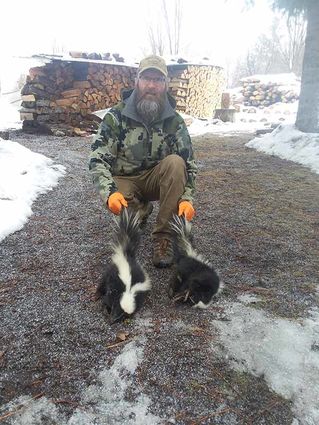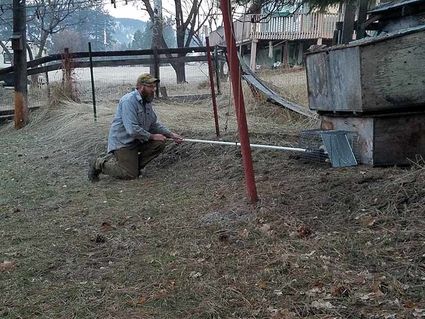STINKY SEASON
Spring brings out the skunks
March 22, 2018

John Hamilton
Dan Helterline of Plains is an ex-smoke jumper and firefighter, and in recent years, has become an expert trapper.
There are skunks among us.
Surely you have smelled the furry varmints by now as spring slowly approaches, or have happened to see one either still living or flattened out on the roadway stinking to the high heavens, it is the season for the annual emergence of the striped skunk.
Given plenty of suitable habitat and available food, many of these black-and-white and smelly-all-over critters live right alongside people, either in towns or around the plentiful country homes, farms and ranches in this area, occasionally releasing some of the stinky, persistent stench they are so famous for.
And skunks don't just smell bad, they are also one of the major carriers of rabies (and a few other nasty diseases, see sidebar for more) in the United States.
That's the bad news for Sanders County residents, the good news is it does not have to be this way; there are viable methods available to control our smelly neighborhood bandits.
The best method for removal seems to be trapping and the humane disposal of said skunks, and that is where Dan Helterline comes in. An ex-forest firefighter and smokejumper who lives in Plains, Helterline has become an expert trapper over the past several years.
He says business has been very good in the skunk-trapping business lately.
"Old decadent buildings and outbuildings are prime habitat for skunks," he said recently, "and they seem to be especially prolific this year. I have caught a lot of them so far and am still doing pretty good."
Helterline, who also traps wolves, coyotes and raccoons, said he has found a market for the skunk hides, and in fact sells the stinky stuff that they produce, called essence, carefully harvesting it and placing it in vials for sale later. Mind you, while staying largely smell-free himself.
Having someone like Helterline come in and handle your skunk problem is a viable option for folks in a variety of ways.
Although some people set up traps and have success in catching their own problem pole cats, many would take advantage of the fact that someone - a professional someone who can utilize the animal while safely removing it from smelling range - could take care of the skunks instead.
For the neophyte skunk trapper, capturing and then successfully getting rid of the critters without getting stunk upon would be a significant accomplishment. And, if successful in catching one, what would then be done with said skunk? Would it be euthanized on the spot or turned loose somewhere else, possibly then causing more problems for other people.
Helterline insists that the sport of trapping is not as bad as its opponents make it out to be.
"Some people think that trapping is cruel, but it is not like that at all," he said. "Modern trapping technology has advanced so much, it really is pretty quick and humane now."
Helterline feels he is providing a valuable service, and the people he has helped relieve of their skunk problems would undoubtedly agree.
"I'm filling a niche that no one else in Sanders County is filling right now," he said. "If I can't use conibears (another type of trap) for lethal removal, I can use live traps and utilize a quick, humane dispatch method that is completely odor-free, if done correctly."
The secret, he says, is to take it slow and when dealing with captured skunks.

John Hamilton
Dan Helterline of Plains has perfected his technique in trapping skunks. For the most part, he says, he is able to avoid getting sprayed when trapping.
He demonstrated his technique during a trapping operation in a Thompson Falls neighborhood last week, calmly working the caged skunk into position and then using a long jab stick tipped with an acetone injector to put the animal down.
As he promised, it was a stink-free operation.
Once the trapping is done, Helterline then takes the skunks back to his home in Plains, where he skins the animals and prepares their hides for sale, in addition to harvesting the essence, also referred to as musk, and placing it in vials for sale as well.
There is a market for the hides to make hats and other curio garments like gloves, he said. Trapping lure makers buy the musk for use in their products.
Although the season for harvesting quality winter pelts from the skunks is winding down, Helterline said he is available for dealing with problem animals in the Sanders County area on a case by case basis, for a nominal fee.





Reader Comments(0)